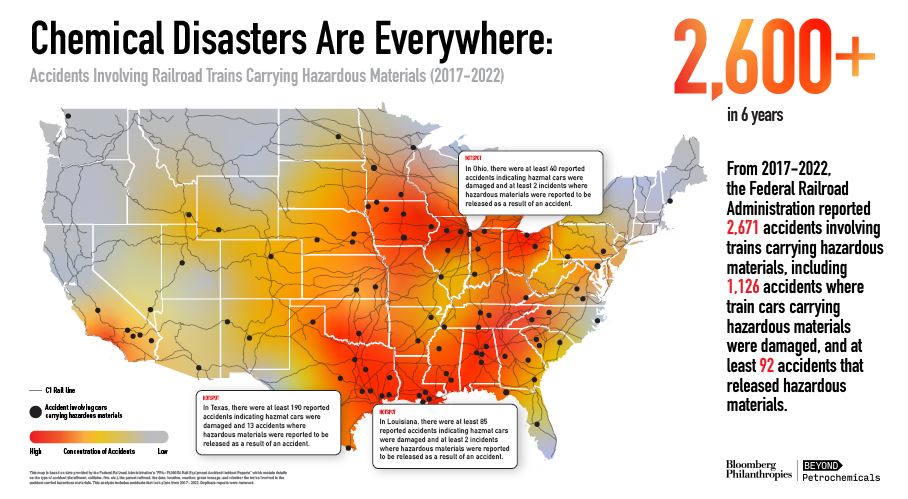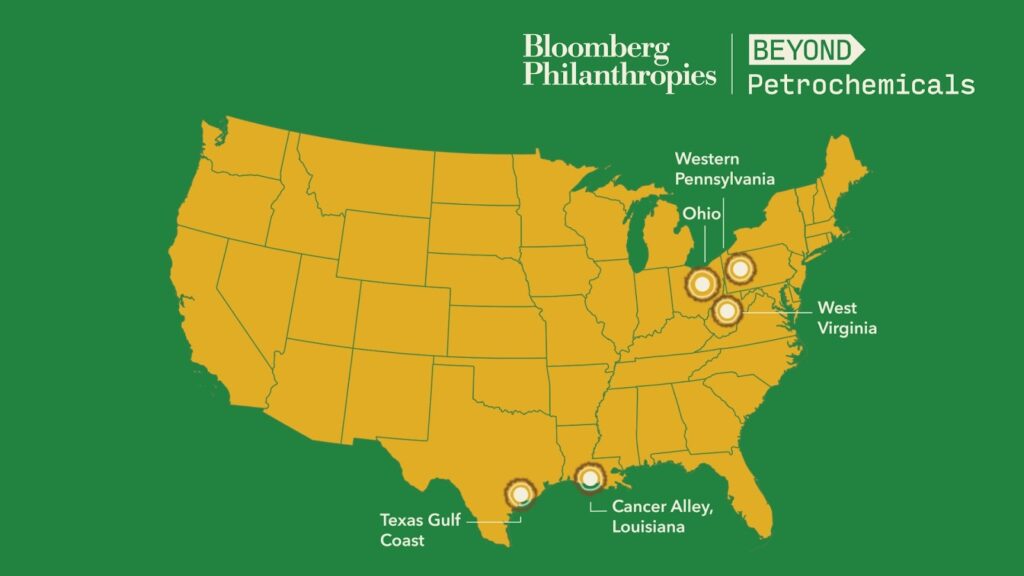The new data released by Bloomberg Philanthropies’ Beyond Petrochemicals Campaign underscores how planned expansion of the petrochemical industry will heighten risks across the U.S.
New York, NY – Today, in the wake of Congress’ first hearing on the train derailment in East Palestine, Ohio, Bloomberg Philanthropies’ Beyond Petrochemicals campaign released new data showing similar disasters are happening all over the United States.
The data shows more than 90 accidents that released hazardous materials took place between 2017 and 2022.
“The East Palestine train derailment is a petrochemical disaster,” said Eric de Place, Interim Director of the Beyond Petrochemicals campaign. “The sad reality is these types of disasters are unfortunately common and happening across the country on a regular basis.”

Petrochemicals like vinyl chloride are known carcinogens that adversely impact human health. Those living within 10 miles of a petrochemical facility face risk of cancer and other health issues according to a 2020 study. Acute exposure to vinyl chloride can cause loss of consciousness, lung and kidney irritation, and after sustained exposure, a rare form of liver cancer.
As the world transitions to clean and renewable energy, oil and gas companies have found a lifeline in petrochemicals and are making massive plans to build out new and existing petrochemical facilities across Texas, the Ohio River Valley, and Louisiana. By 2050, petrochemical applications are expected to account for nearly half of the growth in oil demand.
“Petrochemicals are a triple threat to our health, the environment, and our progress toward mitigating climate change. Communities that live next door to petrochemical manufacturing hubs in Ohio, Louisiana and Texas already acutely feel the impacts of petrochemical production. Further expansion of this industry ensures more communities will become sacrifice zones due to petrochemicals,” said Rev. Lennox Yearwood, Jr., Beyond Petrochemicals Campaign Chair and CEO of the Hip Hop Caucus. “We need to put people over pollution. That begins by holding petrochemical companies accountable for the devastation they are wreaking on people and our climate.”

Petrochemicals like vinyl chloride are known carcinogens that adversely impact human health. Those living within 10 miles of a petrochemical facility face risk of cancer and other health issues according to a 2020 study. Acute exposure to vinyl chloride can cause loss of consciousness, lung and kidney irritation, and after sustained exposure, a rare form of liver cancer.
As the world transitions to clean and renewable energy, oil and gas companies have found a lifeline in petrochemicals and are making massive plans to build out new and existing petrochemical facilities across Texas, the Ohio River Valley, and Louisiana. By 2050, petrochemical applications are expected to account for nearly half of the growth in oil demand.
“Petrochemicals are a triple threat to our health, the environment, and our progress toward mitigating climate change. Communities that live next door to petrochemical manufacturing hubs in Ohio, Louisiana and Texas already acutely feel the impacts of petrochemical production. Further expansion of this industry ensures more communities will become sacrifice zones due to petrochemicals,” said Rev. Lennox Yearwood, Jr., Beyond Petrochemicals Campaign Chair and CEO of the Hip Hop Caucus. “We need to put people over pollution. That begins by holding petrochemical companies accountable for the devastation they are wreaking on people and our climate.”
“Petrochemicals are inherently unsafe,” said Anaïs Peterson, Earthworks. “People living on the frontlines from Appalachia to the Gulf Coast know how harmful even standard operations of this industry are. What happened in East Palestine is not an isolated incident, but a manifestation of the dangers that the petrochemical industry poses to communities across the country – from extraction and transportation to production. We need to learn from the ongoing crisis on this derailment not just to stop the expansion of the petrochemical industry but also take meaningful action to protect communities living under the constant threat of existing petrochemical infrastructure.”
“Profit-driven toxic industries with little to no oversight are public health threats,” Yvette Arellano, Founder and Director, Fenceline Watch. “Allowing petrochemicals to expand their footprint promotes the sense that our communities are disposable and up for sale to the highest bidder. Our future is at stake. We need meaningful action on petrochemicals to address the violation history, hazardous work conditions, and the growing bills communities are left to pay for medical attention and funeral costs that the industry produces.”

